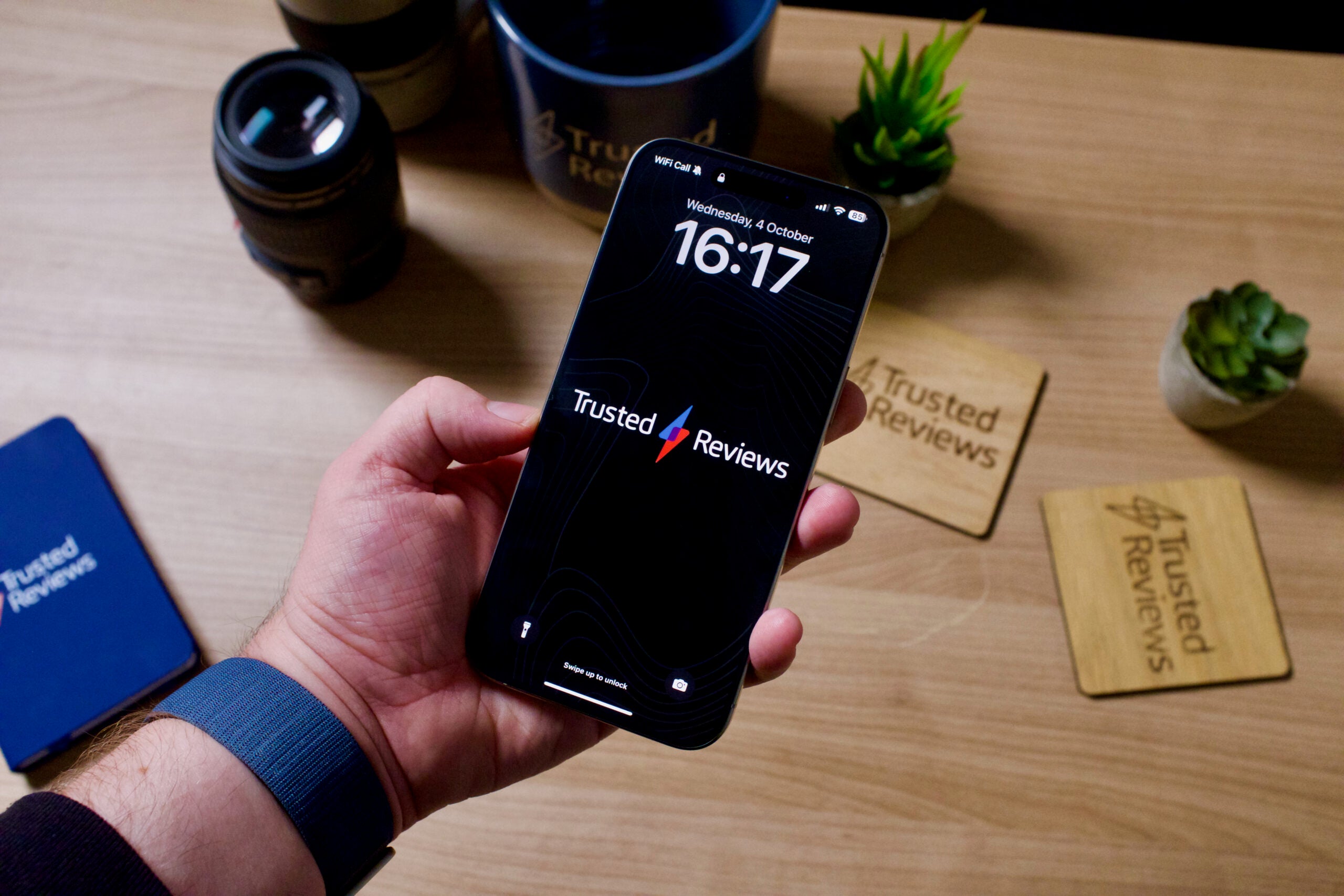Verdict
By addressing the biggest issues with its predecessor, while also adding some welcome extra features, the iPhone 15 Pro Max is more than the iterative update it initially seemed like.
Pros
- It has USB-C (finally)
- 5x zoom is welcome
- Much comfier to hold and use; so much lighter
Cons
- The Action Button is welcome – but it could do more
- No 128GB option means higher price
-
Action ButtonCustomisable key replaces the ringer switch and packs plenty of features -
A17 Pro chipsetVery capable 3nm chipset, with serious graphical grunt -
Titanium bodyThis makes it far lighter than the iPhone 14 Pro
Introduction
Apple has done something quite impressive with the iPhone 15 Pro Max by fixing just about every issue I had with the previous couple of entries in the series.
From slimming the phone down, making it comfier to hold and finally improving its zoom photography skills, the iPhone 15 Pro Max is a much bigger upgrade than it initially seemed.
Add to that the USB-C port, Action Button and the usual year-on-year performance and camera upgrades we expect from Apple, there’s a lot to like here.
But is this the iPhone 15 model to plump for? And does it offer a better alternative than the best Android phones, like the Samsung Galaxy S23 Ultra and OnePlus 11?
Design
- Four colours: Black, Blue, White and Natural
- Much lighter than the 14 Pro Max
- Slight curve to the edges
Apple isn’t in the business of redefining what its phones look like every year. Gone are the days of huge design changes every one or two generations, with the focus now more on refinement. We’ve seen the same shift with Samsung’s flagship Galaxy S and Google’s Pixel range – once a base design is formed, don’t expect that to change for a number of years.
The iPhone 15 Pro Max is the perfect example of this. Apple’s latest high-end phone looks very much like the last few Pro iPhones, with the same general boxy and flat look. There’s plenty of refinement here though, and many of the changes make this the comfiest large iPhone to hold.
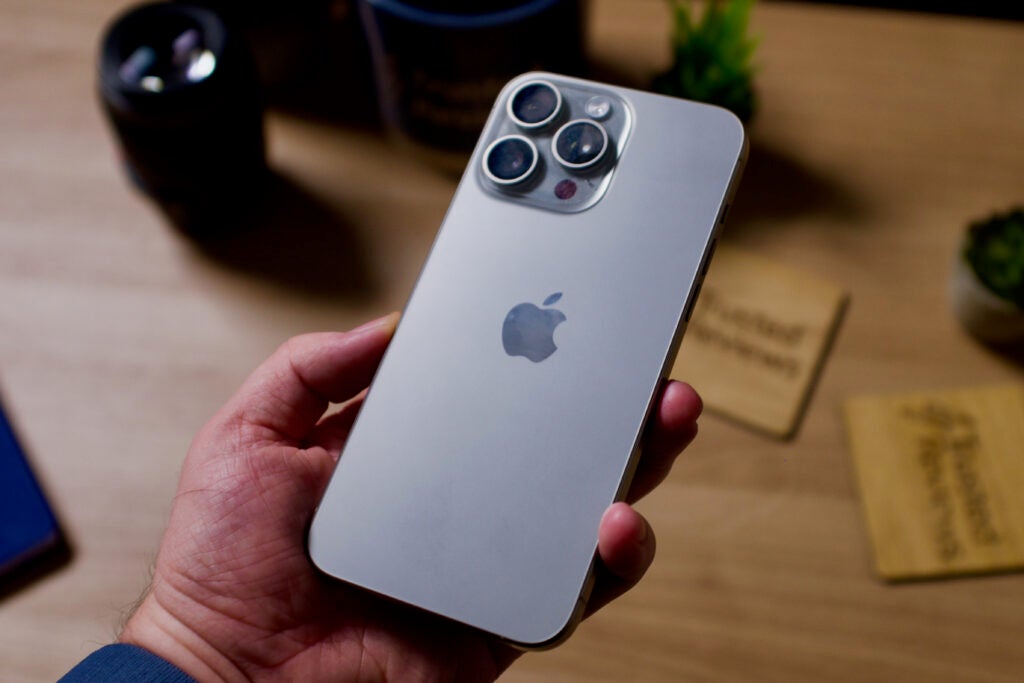
While the sides are still flat, the edges are slightly rounded – like the Apple Watch – giving the phone a softer finish when compared to the very sharp iPhone 14 Pro Max. I said in my review at the time that the shape of the 14 Pro Max made it difficult to hold comfortably. That isn’t an issue anymore.
Those sides are now matte, rather than shiny, and the new finish ensures fingerprints aren’t visible on my Natural Titanium review unit. This doesn’t seem to be the same case on the darker Black and Blue finishes, so best to plump for a lighter colour if you prefer a cleaner look.
For the iPhone 15 Pro Max, Apple has removed two stalwarts of the line. The ring switcher which has sat on every single iPhone has been ditched, as has the Lightning port that has been the main method of charging the phone for over a decade.
The ringer switch was an iconic part of the iPhone, and made it easy not only to flick the device to silent without pulling it from a pocket, but also to check whether silent or ringer mode was enabled. The Action Button is no use for the latter, yet I still think the change is for the best.
Those who picked up an Apple Watch Ultra (or an Apple Watch Ultra 2) will already be familiar with the Action Button. Basically, this is a user-customisable key that can perform various tasks, from muting the phone to opening the camera and more.
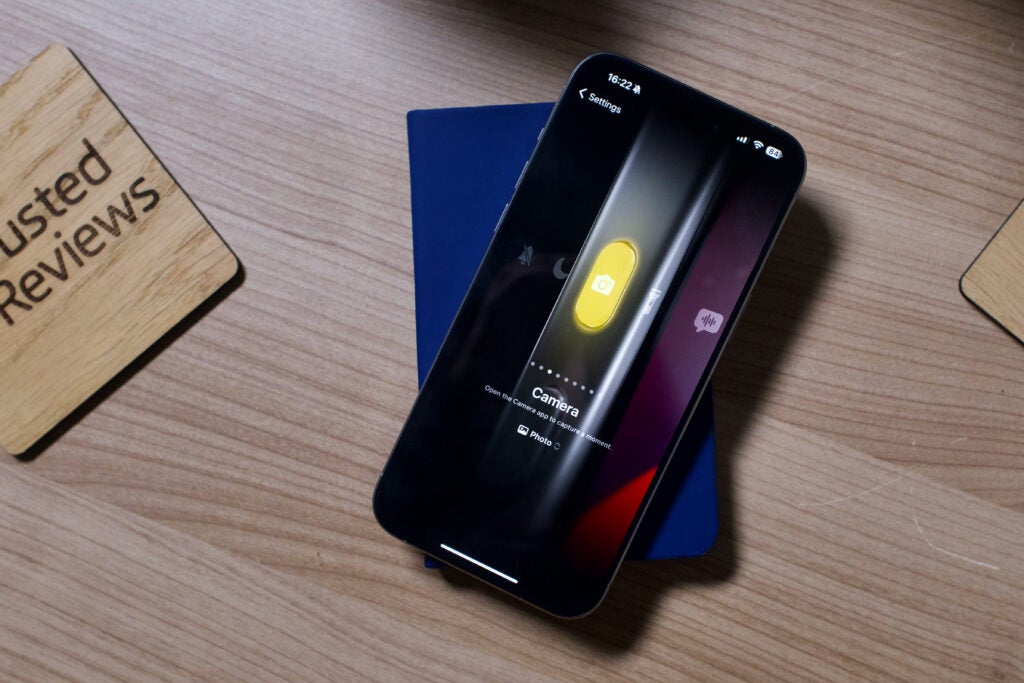
As someone who mostly keeps their phone on silent, I instantly set the function of the Action Button to operating the camera – and I doubt I’ll change it again. Now, a press of the Action Button takes me straight into the camera – while a further press acts as a shutter button.
Head into Settings and the button can be changed to open the flashlight, start recording a voice memo, enable accessibility zoom or enact any shortcut devised in the Shortcut app. It’s great to see Apple really open the use of this button up to basically anything, even if there’s still plenty of room for improvement.
For instance, having one functionality set to a single press and another to double press seems like a no-brainer – allowing me to press once for the camera and twice to ensure the phone is in silent mode. This could also work with longer and shorter presses. Maybe we’ll get this in iOS 18, or when the Action Button arrives on all iPhone models.
The replacement for the Lightning port is USB-C, a connector found on MacBooks, iPads, Android phones, cameras, the Nintendo Switch and much more besides. It’s taken long enough for Apple to adopt the standard port, and we’ve likely got new EU legislation to thank for the move.
Really, there’s little to say about the port. It’s great being able to charge a MacBook, iPhone and iPad from a single cable – but if you’ve got Lightning cables, accessories or AirPods lying around then you’ll still need multiple cables to charge everything.
Another big change this year is the switch from a stainless steel body to one finished with grade 5 titanium. Apple is really going big on titanium with its marketing for the new phone, plastering it across TV spots and adverts. In my two weeks with the phone, it feels to me like the change has been beneficial.
Switching to titanium has had a noticeable effect on the phone’s overall weight. The iPhone 15 Pro Max is around 19g lighter than the 14 Pro Max, which might sound minimal but in use makes a world of difference. I always felt the Pro Max series has been far too heavy, and thankfully that’s no longer an issue.
Titanium should also add some extra durability to the sides of the phones, although after a solid year of use – all without a case – my iPhone 14 Pro Max still remains in absolute pristine condition. Hopefully, it’ll be a similar story in another 12 months.
An IP68 rating for protection from water and dust remains, and Apple’s Ceramic Shield remains to add protection to the screen. The slightly curved screen will likely make applying screen protectors a little trickier, but so far my screen has remained free of any notable scratches.
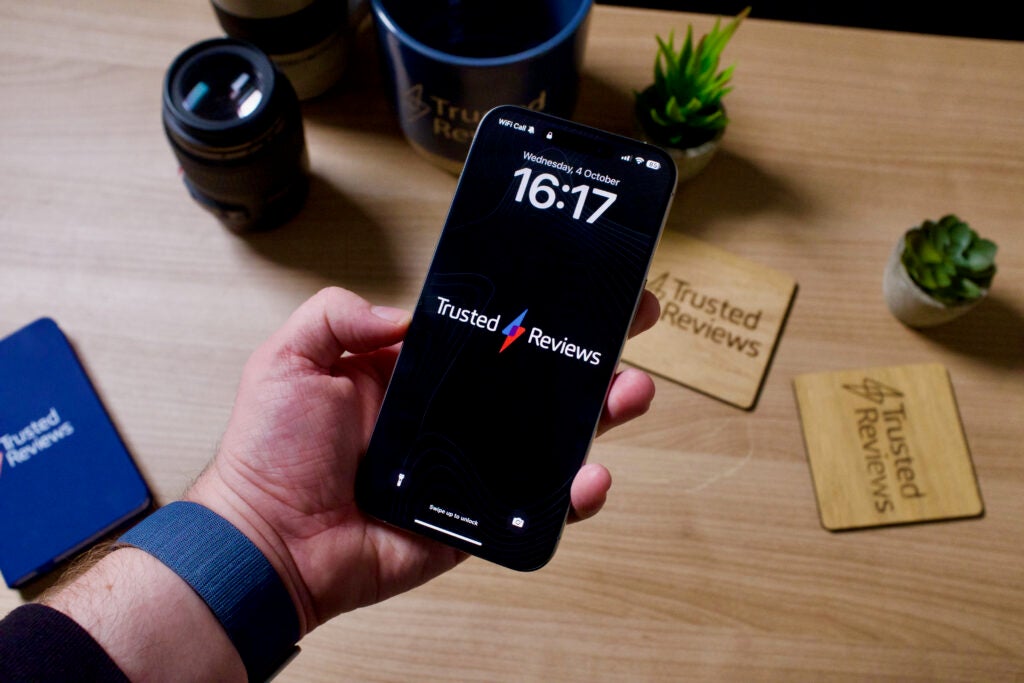
Now, as ever with an Apple launch, there has been some controversy. Online bend tests have shown the 15 Pro Max to be easier to bend and snap than previous iPhones, likely due to the new design that makes repairing the back part of the phone easier and cheaper than before. While I can’t say you won’t break the phone if you bend it, I wouldn’t suggest trying that and I would be very surprised if this phone broke due to the new design in general use.
Making the glass portion of the back able to be fixed without taking the device apart is important in numerous ways. It allows Apple to charge far less for a repair, which means those who crack the back glass are more likely to get it repaired rather than picking up a whole new phone.
Along with making the phone easier to repair, the iPhone 15 Pro Max has a structural frame made from 100% recycled aluminium and a box free of single-use plastic.
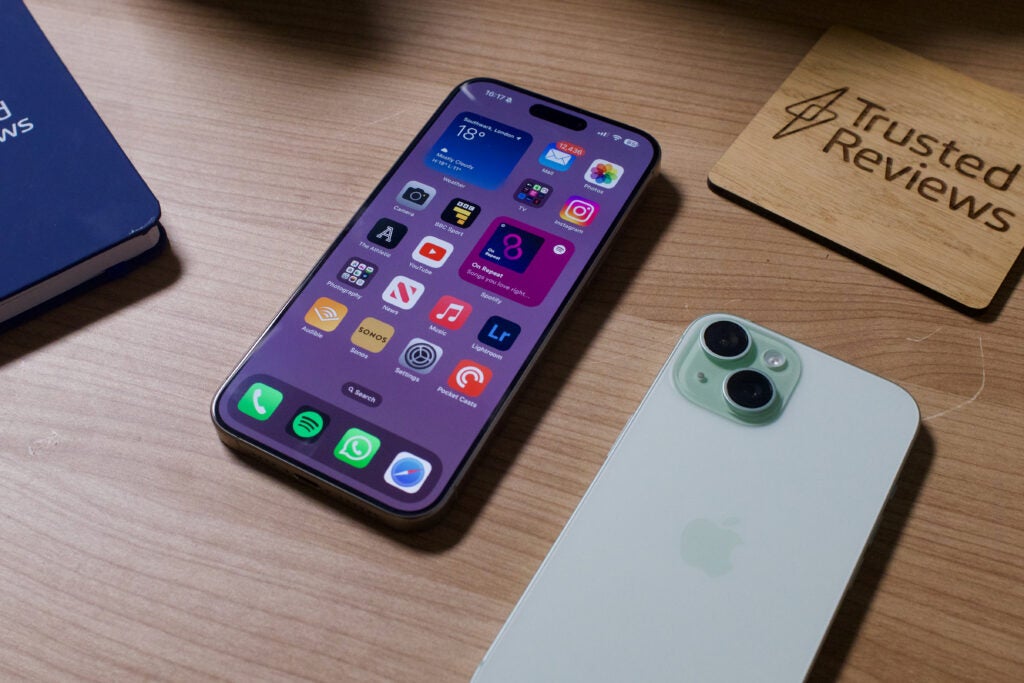
Screen
- Slightly thinner bezels than the iPhone 14 Pro series
- Excellent quality OLED panel
- Dynamic Island remains
Apple’s Pro line of phones has always had some of the best screens around, and the lovely 6.7-inch panel on the 15 Pro Max is no different.
In line with the design changes, the bezel running around the display is thinner than it was on the iPhone 14 Pro Max. I think this is a noticeable improvement, especially if you’re coming from an older iPhone, and it makes video content and games a little more immersive.
Thinner bezel aside, the screen here matches up to what Apple shipped last year. It remains an OLED panel, with a sharp 2796 x 1290 resolution, has impressive levels of brightness if you’re outside in sunny conditions and feels smooth thanks to the ProMotion adaptive refresh rate feature.
If you like watching videos on your phone, there’s no better choice than the 15 Pro Max. No other phone I have used produces an HDR image as convincing as this, with the brightest point making itself immediately known. Spider-Man Across The Spider-Verse in Dolby Vision really pops off the screen with the bright colours and deep contrast making great use of the screen.
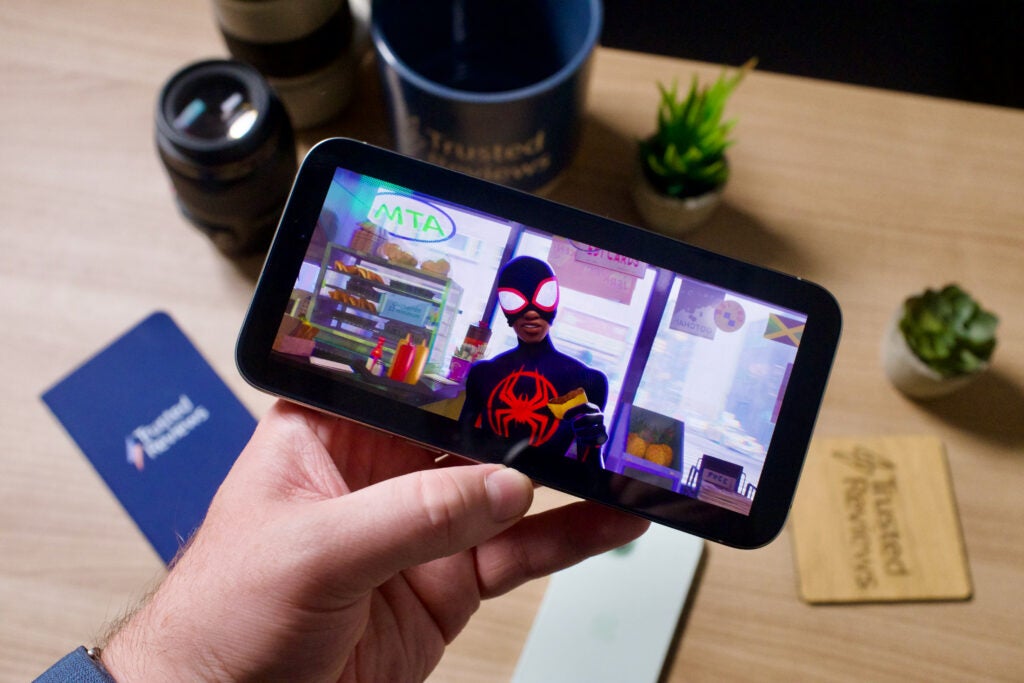
The Dynamic Island also remains, offering up a secondary screen area for static notifications from certain apps and Live Activities.
I still feel the Dynamic Island is a stepping stone until we get that true all-screen iPhone and it hasn’t really been truly used properly by developers. Some apps work fantastically well with it – Fotmob’s sports scores and Flighty’s flight tracking being two of my favourites – but there still seems an odd disconnect between system notifications and Dynamic Island notifications that can be confusing. It’s better than a notch, though and now it’s present on all the new iPhones, developers could be more keen to use it in interesting ways.
Camera
- The telephoto zoom has been upped to 5x
- Log video recording added
- Three rear cameras with multiple focal lengths
The big news regarding the camera for the iPhone 15 Pro Max is that Apple has finally improved the quality of the telephoto zoom, upping it from a 3x zoom to a far more useful 5x (120mm equivalent).
This is still way off what Samsung offers with the Galaxy S23 Ultra – still the zoom champ in my eyes – and this added zoom is only available on the Max version, with the smaller Pro sticking to the same 3x telephoto lens.
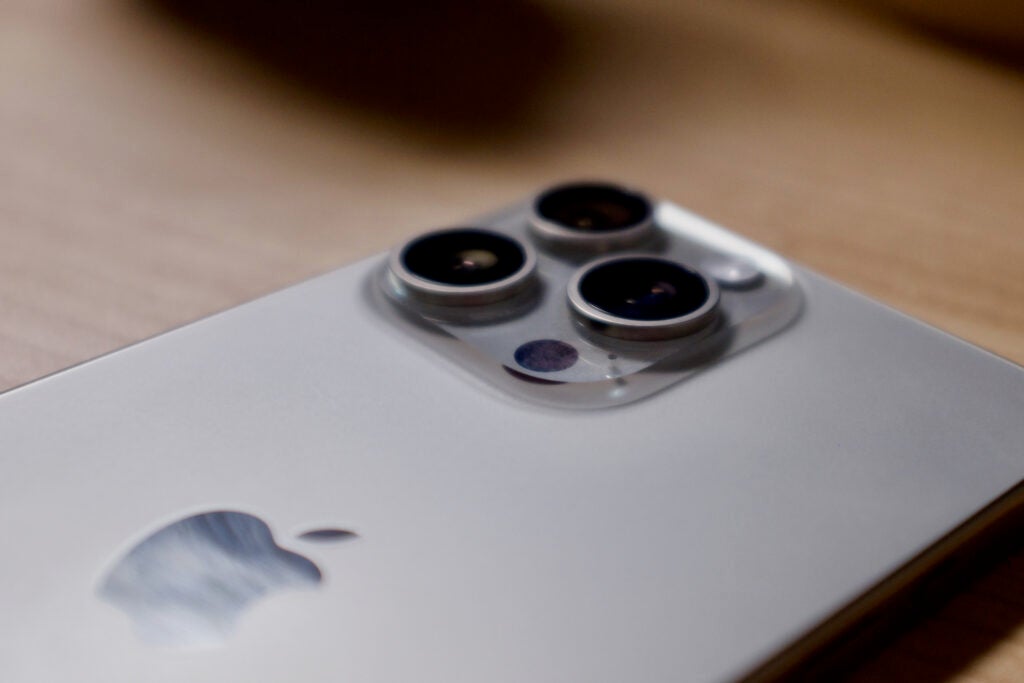
Throughout my time shooting with the iPhone 15 Pro Max I have found myself punching into the 5x lens far more than I ever did with the 3x option.
Being able to get that bit closer is so much more useful and it offers far more versatility. I always found 3x didn’t really get you that much closer, whereas shooting far away tall buildings in central London with the 5x feels worthwhile. The quality of the images is good, especially in daylight situations where colours are rich and detailed. The addition of OIS and sensor-shift stabilisation helps too.

Things are less impressive in lower-light situations, where the sensor – which is much smaller than the one inside the main camera – struggles and often fills images with noisy details.
I have even noticed in some darker situations that the camera will ditch the telephoto camera completely and just zoom in from the main camera, with no obvious way to stop this happening.
A photo shot at 1x
A photo shot at 2x
A photo shot at 5x
The other two rear cameras and the single camera on the front are mostly unchanged – though a number of tweaks in the software have improved the overall photography experience.
The 48-megapixel f/1.8 main camera, for instance, now shoots 24-megapixel shots by default, adding an extra hit of detail for only a marginally larger file size. The 12-megapixel ultra-wide feels a little left out, though still captures nice photos that match the main sensor for colour reproduction.
There’s a nice natural bokeh
There’s also now the option to move the main camera between 24mm (1x), 28mm (1.2x) and 35mm (1.5x) and any of these can be set as the default focal length – great if you love shooting at 35mm and want it always at hand. This is all using software trickery, with Apple’s Deep Fusion tech and various methods of combining multiple shots together. The results are very good, and don’t look like simply using digital zoom.
As someone who spends a lot of time taking pictures of my dog, I really like the way portrait mode works on the iPhone 15 Pro Max. Instead of forcing you into the dedicated portrait mode ahead of time, the camera is now smart enough to let you add that blurry background bokeh effect even after the photo is taken.


This doesn’t work at night, or for every daylight snap, but if you’re taking a shot of a person or an animal, you’ll see an option in the Photos to add the portrait effect. It even works with selfies too.
You can also move focus after the fact, giving a lot more freedom to be creative. This all works just as well as starting things off in portrait mode, just without sacrificing a shot if the effect doesn’t work.
I still firmly believe that which camera phone is the best varies widely depending on what you want from a photo. The Samsung Galaxy S23 Ultra has more of a punch to brighter colours, while the Google Pixel 7 Pro really pushes highlights and contrast up to give a more striking effect. Then there’s the Xiaomi 13 Ultra, which aims to do as little as possible to the image.
For me, the iPhone 15 Pro Max does a little bit of everything: colours are natural and realistic and details are present without looking oversharpened. The iPhone also remains incredibly reliable, producing a usable image pretty much every single time – I can’t say this about the S23 Ultra. Apple’s focus on tougher lighter conditions has left general outdoor landscape photography looking very much the same as it did two or three generations ago. I think landscape shots look that great, with a very flat overall image. This can be said for a lot of phones, though.
I will still give Google the upper hand in low-light situations though. Here, I find the iPhone’s lens still too reflective and this leaves weird reflections on the resulting image.
The big new addition to the video skills of the iPhone this year is the ability to shoot in log. This is a format favoured by videographers as it captures a very flat base image, which can then be colour-graded to give a more distinct style.
Shooting in log allows colours to be far more easily matched up between different cameras, something that pros will appreciate as long as they are happy to shoot in ProRes log. The iPhone 15 Pro Max (and the other models in the family, for that matter) shoot the best video of any phone we have reviewed.
Performance
- A17 Pro chipset is supremely capable
- The SIM slot is sticking around in most regions
- 256GB base storage, 8GB RAM
The iPhone 15 Pro Max is powered by the A17 Pro chipset, a change in name from the Bionic branding Apple has used for its chip over the past few years. Base storage jumps up to 256GB – a move that allows Apple to avoid talk of a price rise – and goes all the way to 1TB. RAM has jumped from 6GB to 8GB, too.
There’s plenty to get excited about here, and it does seem like that ‘Pro’ branding is appropriate.
Before I dig into the chip, there have been some concerns about overheating in the weeks after the release of the iPhone 15 Pro Max. It seems like this can vary by device – Apple has admitted there could be some issues with certain apps – and I haven’t noticed it at all. In fact, the iPhone 15 Pro Max I have here for review stays considerably cooler than the 14 Pro Max, which tended to get very hot on the iOS 17 beta even in basic tasks like streaming YouTube.
The Apple A17 Pro packs a 6-core CPU, which consists of four high-efficiency cores plus two high-performance cores for power-intensive workloads. That’s the same makeup of the CPU found inside the A16 Bionic and A15 Bionic processors, although the chip is now built on the more efficient 3nm process. There’s a boost to the GPU too – Apple says around 20% – and a lot of promise of this chip in its graphics skills.
You can see how the iPhone 15 Pro Max performs in our usual suite of benchmarking tests below, but safe to say this phone has a comfortable lead over its Android counterparts if synthetic benchmark numbers are important.
A highlight for me during Apple’s launch of the iPhone 15 series was the news that ‘console-quality games’, including Resident Evil 4 and Assassin’s Creed Mirage, will be arriving on the App Store. Apple was clear to say these won’t be simple mobile games, but full-fat ports of games you’d play on a PC or PS5.
None of these games are available yet, however I will update this review with thoughts once they are. If they really are ‘console-quality’, then the iPhone 15 Pro Max could easily be one of the best portable gaming systems around, especially if paired with a Backbone One or Razer Kishi controller.
There’s a lot going on with the A17 Pro chip, though for most people the sheer power onboard will likely be never fully utilised. From an everyday use perspective, the iPhone 15 Pro Max feels fast and responsive, but I have said the same about each previous iPhone I have reviewed. There’s nothing noticeably different here.
The addition of the USB-C port on the bottom does increase the functionality of the phone somewhat. Unlike the standard USB 2 port on the iPhone 15, the Pro versions have a USB 3 port that offers much quicker file transfers when using a capable cable. Frustratingly, Apple doesn’t supply a faster cable with the phone, so that’ll need to be picked up separately.
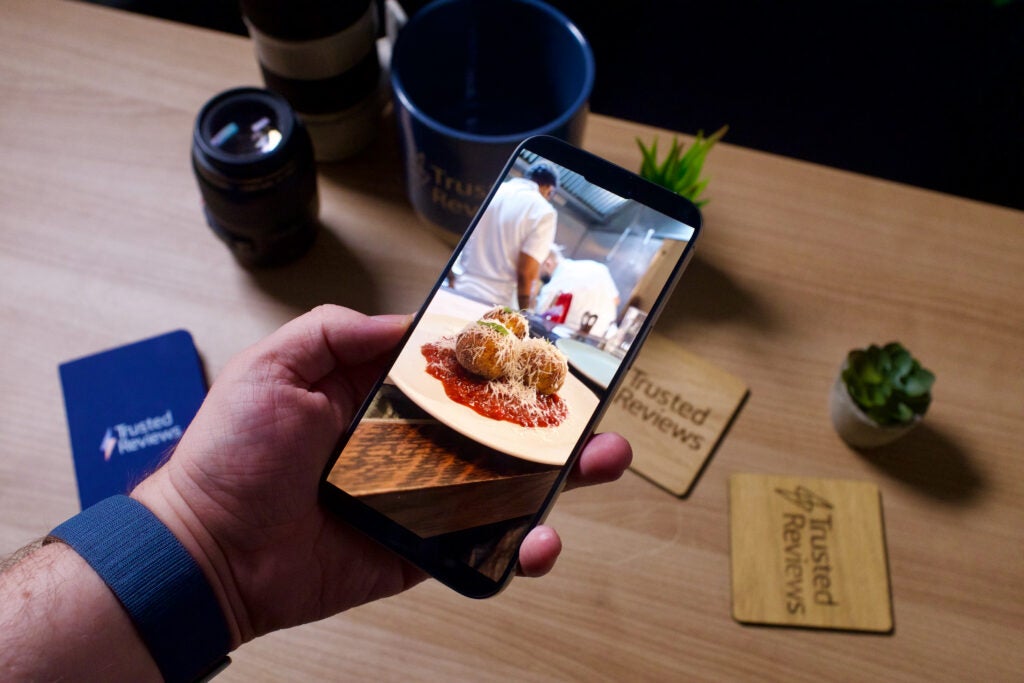
You can also plug in USB-C accessories – an SD card reader, for example, to quickly import snaps from a camera or an SSD to capture ProRes video bypassing the phone’s storage. It’s these changes that really make this an excellent iPhone upgrade.
Wi-Fi 6E support is great for those who have a supported router, and while a physical SIM slot remains in all models aside from those sold in the USA, eSIM is a welcome option for roaming.
Software
- This phone will likely be supported with updates for a long time
- iOS 17 comes preinstalled
- StandBy is a great new addition to
The iPhone 15 Pro Max comes running iOS 17, the same software rolling out to phones as old as the iPhone XR and XS. Apple doesn’t confirm how many future software updates this phone will get, but expect it to receive big updates packed with new features for at least five to six years, and very likely longer.
As the majority of iOS 17 features come to older phones, there’s no obvious reason to upgrade for the new software, Still, there are plenty of exciting additions here.
Highlights for me include StandBy, a kind of bedside mode that jumps into gear when the phone is charging horizontally. I’ve got this setup on my bedside table, with TwelveSouth’s neat little Forte dock, so that when I pop the phone down to charge it displays a clock, any calendar appointments I have and the weather. It works great as a smart alarm clock, with Live Activities, notifications and music playback baked in.
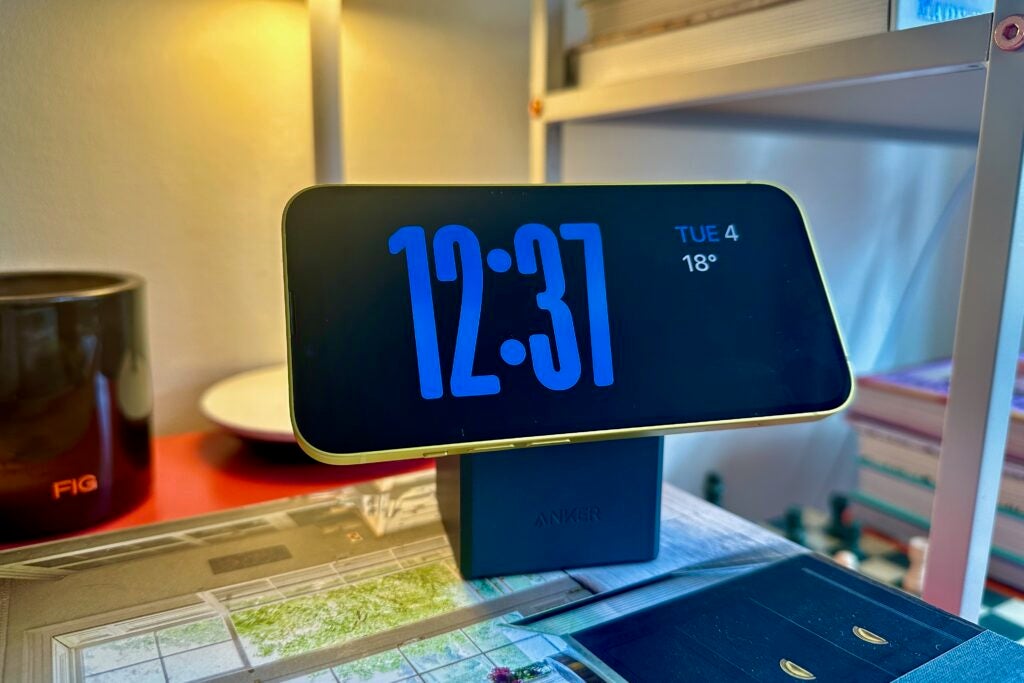
iOS 17 also includes some welcome phone upgrades, including a Live Voicemail feature that’ll transcribe incoming messages and a far smarter keyboard that seems to finally remember the words you use the most. Widgets can be interactive too, so it’s possible to start a podcast playing without going into the app.
Battery Life
- USB-C replaces the Lightning port
- Charging speeds remain very much the same, as does endurance
- You’ll still need to provide the charger
Battery life wasn’t a notable talking point during the launch of the iPhone 15 series and if you look at Apple’s site, it only compares endurance against the iPhone 12 Pro. After having used the phone for nearly two weeks, I can see why it wasn’t mentioned much – it’s almost identical to that of the iPhone 14 Pro Max.
There’s no huge improvement in endurance here, and how long the phone lasts will really depend on how hard it is pushed. If you’re a lighter user, mainly texting throughout the day with some TikTok scrolling and very basic gaming thrown in then it should last just about two days. Disable the always-on display option, and you’re almost guaranteed to get that two days.
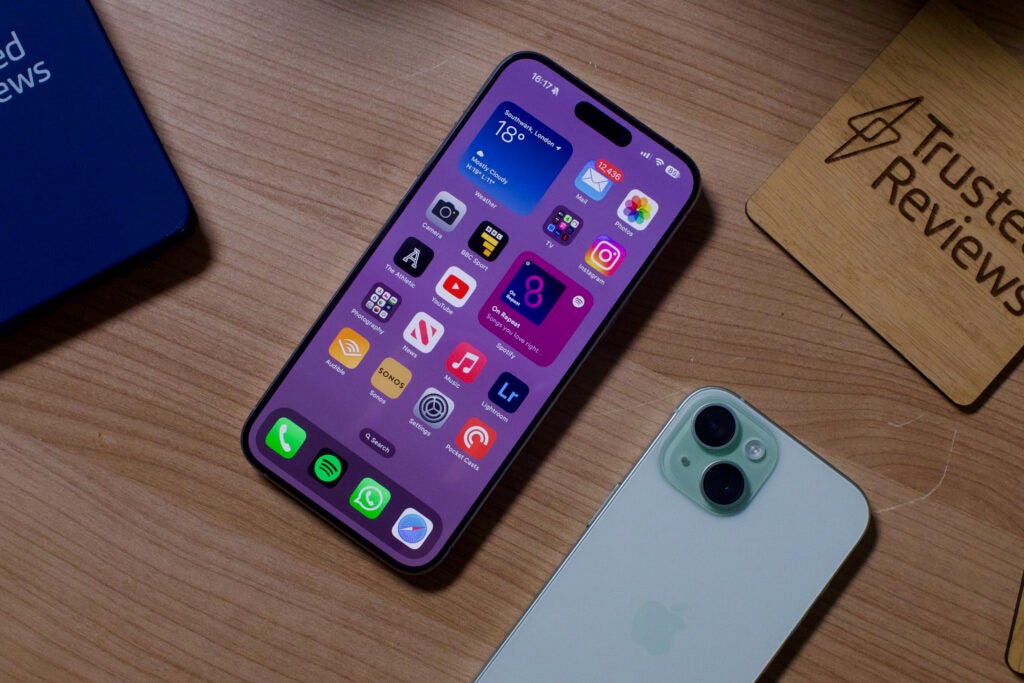
Push the phone harder though, and a nightly charge is required. Recording ProRes footage in the camera really hampers battery life, as does streaming HDR content that really pushes the brightness levels of the screen up.
I ran a bunch of battery tests on the iPhone 15 Pro Max and most of the results are exactly the same as the iPhone 14 Pro Max. An hour of HDR content streamed from Netflix ate through 8% on the newer phone and 9% on last year’s model. 30 minutes of intensive gaming took off 8% on the 14 Pro Max, and 9% here.
Most days throughout the review period I have ended up with 20-30% left in the tank – enough to last me a morning commute If I forgot to plug the phone in overnight, but not a full second day. This equates to good battery life, though nothing out of the ordinary for a phone of this size.
I was expecting Apple to focus a little more on charging speeds with the move to USB-C, speeding up the time it took the phone to go from 0-100%. This isn’t really the case, and it still takes roughly 90 minutes for a full charge and 30 minutes for 50%. These numbers stayed the same, whether I was using an Apple 20w plug or a 30w capable alternative from Anker.
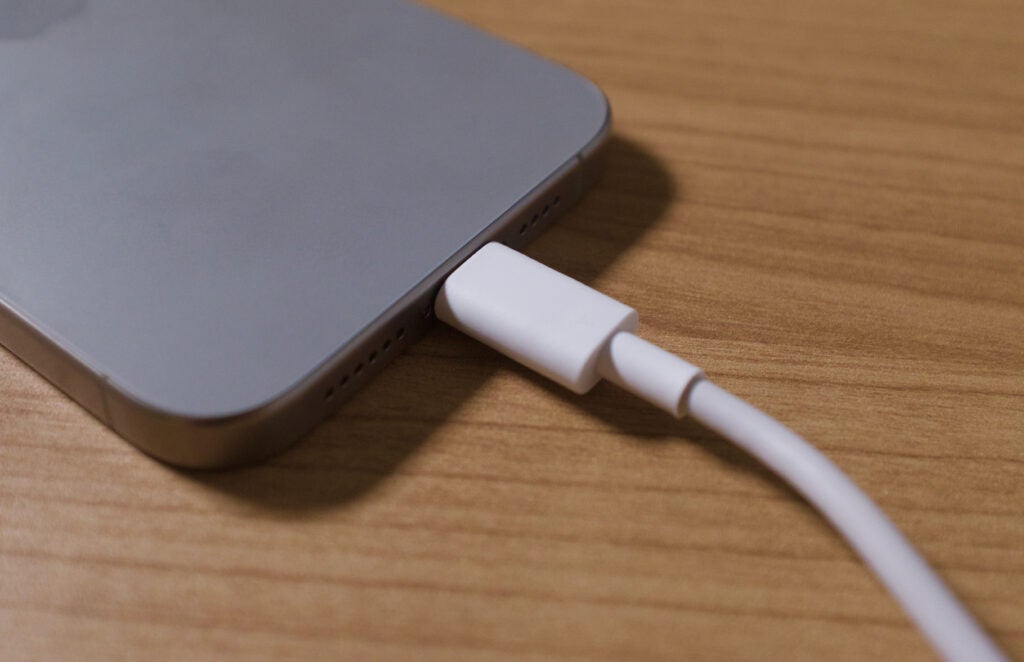
It’s pretty clear that Apple, like Samsung and Google, have no interest in battling Chinese brands like Oppo, OnePlus and Xiaomi for super-speedy charging speeds.
Latest deals
Should you buy it?
You should buy if you want the best iPhone
This is the best iPhone – it’s as easy as that. It has the best camera, the best screen and the design changes make it the most accessible Max device yet.
You shouldn’t buy if you upgraded to the 14 Pro (or even the 13 Pro)
While this is a great phone, the previous couple of iPhones remain excellent choices and I don’t think there’s a single standout feature here that screams for an immediate upgrade. Still, this is one of the best phones around.
Final Thoughts
The iPhone 15 Pro Max is an exceptional smartphone. It does a lot and puts a lot of pressure on Samsung, Oppo and Xiaomi to make vast upgrades over the next 12 months.
Importantly, Apple has fixed the number of issues I had with the iPhone 14 Pro Max. The weight has been drastically reduced, the sides rounded for a comfier feel and the defunct Lightning port replaced with a much more modern alternative. Then there are the smaller changes like the matte sides repelling fingerprints and the bezel being reduced.
It would have been nice if the charging had been faster and a higher-specced USB-C had been included in the box. The price has also jumped up, by process of the base 128GB model saying bye-bye. Look at the 256GB models though and the UK price has actually slightly dropped over last year.
It’s not a complete reinvention of the series and those who upgraded to the 14 Pro (or even 13 Pro) shouldn’t feel the need to rush out to upgrade. Those phones remain excellent, and the slew of features in iOS 17 only make them better.
How we test
We test every mobile phone we review thoroughly. We use industry standard tests to compare features properly and we use the phone as our main device over the review period. We’ll always tell you what we find and we never, ever, accept money to review a product.
Used as main phone for more than a week
Taken hundreds of photos in various conditions
Compared against the iPhone 14 Pro Max
FAQs
Four colours are available: Black Titanium, Blue Titanium, White Titanium and Natural Titanium.
The phone should charge fastest with chargers between 20 and 30w. A full charge takes around 90 minutes.
Trusted Reviews test data
Geekbench 5 single core
Geekbench 5 multi core
Geekbench 6 single core
Geekbench 6 multi core
Max brightness
1 hour video playback (Netflix, HDR)
Battery drain 60-min (music streaming online)
Battery drain 60-min (music streaming offline)
30 minute gaming (intensive)
30 minute gaming (light)
1 hour music streaming (online)
1 hour music streaming (offline)
Time from 0-100% charge
Time from 0-50% charge
30-min recharge (included charger)
15-min recharge (included charger)
GFXBench – Aztec Ruins
GFXBench – Car Chase
UK RRP
USA RRP
EU RRP
CA RRP
AUD RRP
Manufacturer
Screen Size
Storage Capacity
Rear Camera
Front Camera
Video Recording
IP rating
Wireless charging
Fast Charging
Size (Dimensions)
Weight
ASIN
Operating System
Release Date
First Reviewed Date
Resolution
HDR
Refresh Rate
Ports
Chipset
RAM
Colours
Stated Power
Jargon buster
mAh
An abbreviation for milliampere-hour and a way to express the capacity of batteries, especially smaller ones in phones. In most cases the higher the mAh, the longer the battery will last but this isn’t always the case.
5G
Offering faster download and upload speeds when compared to 4G. Great for game streaming and HDR video playback. Not supported everywhere yet and speeds vary wildly.
Verdict
By addressing the biggest issues with its predecessor, while also adding some welcome extra features, the iPhone 15 Pro Max is more than the iterative update it initially seemed like.
Pros
- It has USB-C (finally)
- 5x zoom is welcome
- Much comfier to hold and use; so much lighter
Cons
- The Action Button is welcome – but it could do more
- No 128GB option means higher price
-
Action ButtonCustomisable key replaces the ringer switch and packs plenty of features -
A17 Pro chipsetVery capable 3nm chipset, with serious graphical grunt -
Titanium bodyThis makes it far lighter than the iPhone 14 Pro
Introduction
Apple has done something quite impressive with the iPhone 15 Pro Max by fixing just about every issue I had with the previous couple of entries in the series.
From slimming the phone down, making it comfier to hold and finally improving its zoom photography skills, the iPhone 15 Pro Max is a much bigger upgrade than it initially seemed.
Add to that the USB-C port, Action Button and the usual year-on-year performance and camera upgrades we expect from Apple, there’s a lot to like here.
But is this the iPhone 15 model to plump for? And does it offer a better alternative than the best Android phones, like the Samsung Galaxy S23 Ultra and OnePlus 11?
Design
- Four colours: Black, Blue, White and Natural
- Much lighter than the 14 Pro Max
- Slight curve to the edges
Apple isn’t in the business of redefining what its phones look like every year. Gone are the days of huge design changes every one or two generations, with the focus now more on refinement. We’ve seen the same shift with Samsung’s flagship Galaxy S and Google’s Pixel range – once a base design is formed, don’t expect that to change for a number of years.
The iPhone 15 Pro Max is the perfect example of this. Apple’s latest high-end phone looks very much like the last few Pro iPhones, with the same general boxy and flat look. There’s plenty of refinement here though, and many of the changes make this the comfiest large iPhone to hold.

While the sides are still flat, the edges are slightly rounded – like the Apple Watch – giving the phone a softer finish when compared to the very sharp iPhone 14 Pro Max. I said in my review at the time that the shape of the 14 Pro Max made it difficult to hold comfortably. That isn’t an issue anymore.
Those sides are now matte, rather than shiny, and the new finish ensures fingerprints aren’t visible on my Natural Titanium review unit. This doesn’t seem to be the same case on the darker Black and Blue finishes, so best to plump for a lighter colour if you prefer a cleaner look.
For the iPhone 15 Pro Max, Apple has removed two stalwarts of the line. The ring switcher which has sat on every single iPhone has been ditched, as has the Lightning port that has been the main method of charging the phone for over a decade.
The ringer switch was an iconic part of the iPhone, and made it easy not only to flick the device to silent without pulling it from a pocket, but also to check whether silent or ringer mode was enabled. The Action Button is no use for the latter, yet I still think the change is for the best.
Those who picked up an Apple Watch Ultra (or an Apple Watch Ultra 2) will already be familiar with the Action Button. Basically, this is a user-customisable key that can perform various tasks, from muting the phone to opening the camera and more.

As someone who mostly keeps their phone on silent, I instantly set the function of the Action Button to operating the camera – and I doubt I’ll change it again. Now, a press of the Action Button takes me straight into the camera – while a further press acts as a shutter button.
Head into Settings and the button can be changed to open the flashlight, start recording a voice memo, enable accessibility zoom or enact any shortcut devised in the Shortcut app. It’s great to see Apple really open the use of this button up to basically anything, even if there’s still plenty of room for improvement.
For instance, having one functionality set to a single press and another to double press seems like a no-brainer – allowing me to press once for the camera and twice to ensure the phone is in silent mode. This could also work with longer and shorter presses. Maybe we’ll get this in iOS 18, or when the Action Button arrives on all iPhone models.
The replacement for the Lightning port is USB-C, a connector found on MacBooks, iPads, Android phones, cameras, the Nintendo Switch and much more besides. It’s taken long enough for Apple to adopt the standard port, and we’ve likely got new EU legislation to thank for the move.
Really, there’s little to say about the port. It’s great being able to charge a MacBook, iPhone and iPad from a single cable – but if you’ve got Lightning cables, accessories or AirPods lying around then you’ll still need multiple cables to charge everything.
Another big change this year is the switch from a stainless steel body to one finished with grade 5 titanium. Apple is really going big on titanium with its marketing for the new phone, plastering it across TV spots and adverts. In my two weeks with the phone, it feels to me like the change has been beneficial.
Switching to titanium has had a noticeable effect on the phone’s overall weight. The iPhone 15 Pro Max is around 19g lighter than the 14 Pro Max, which might sound minimal but in use makes a world of difference. I always felt the Pro Max series has been far too heavy, and thankfully that’s no longer an issue.
Titanium should also add some extra durability to the sides of the phones, although after a solid year of use – all without a case – my iPhone 14 Pro Max still remains in absolute pristine condition. Hopefully, it’ll be a similar story in another 12 months.
An IP68 rating for protection from water and dust remains, and Apple’s Ceramic Shield remains to add protection to the screen. The slightly curved screen will likely make applying screen protectors a little trickier, but so far my screen has remained free of any notable scratches.

Now, as ever with an Apple launch, there has been some controversy. Online bend tests have shown the 15 Pro Max to be easier to bend and snap than previous iPhones, likely due to the new design that makes repairing the back part of the phone easier and cheaper than before. While I can’t say you won’t break the phone if you bend it, I wouldn’t suggest trying that and I would be very surprised if this phone broke due to the new design in general use.
Making the glass portion of the back able to be fixed without taking the device apart is important in numerous ways. It allows Apple to charge far less for a repair, which means those who crack the back glass are more likely to get it repaired rather than picking up a whole new phone.
Along with making the phone easier to repair, the iPhone 15 Pro Max has a structural frame made from 100% recycled aluminium and a box free of single-use plastic.

Screen
- Slightly thinner bezels than the iPhone 14 Pro series
- Excellent quality OLED panel
- Dynamic Island remains
Apple’s Pro line of phones has always had some of the best screens around, and the lovely 6.7-inch panel on the 15 Pro Max is no different.
In line with the design changes, the bezel running around the display is thinner than it was on the iPhone 14 Pro Max. I think this is a noticeable improvement, especially if you’re coming from an older iPhone, and it makes video content and games a little more immersive.
Thinner bezel aside, the screen here matches up to what Apple shipped last year. It remains an OLED panel, with a sharp 2796 x 1290 resolution, has impressive levels of brightness if you’re outside in sunny conditions and feels smooth thanks to the ProMotion adaptive refresh rate feature.
If you like watching videos on your phone, there’s no better choice than the 15 Pro Max. No other phone I have used produces an HDR image as convincing as this, with the brightest point making itself immediately known. Spider-Man Across The Spider-Verse in Dolby Vision really pops off the screen with the bright colours and deep contrast making great use of the screen.

The Dynamic Island also remains, offering up a secondary screen area for static notifications from certain apps and Live Activities.
I still feel the Dynamic Island is a stepping stone until we get that true all-screen iPhone and it hasn’t really been truly used properly by developers. Some apps work fantastically well with it – Fotmob’s sports scores and Flighty’s flight tracking being two of my favourites – but there still seems an odd disconnect between system notifications and Dynamic Island notifications that can be confusing. It’s better than a notch, though and now it’s present on all the new iPhones, developers could be more keen to use it in interesting ways.
Camera
- The telephoto zoom has been upped to 5x
- Log video recording added
- Three rear cameras with multiple focal lengths
The big news regarding the camera for the iPhone 15 Pro Max is that Apple has finally improved the quality of the telephoto zoom, upping it from a 3x zoom to a far more useful 5x (120mm equivalent).
This is still way off what Samsung offers with the Galaxy S23 Ultra – still the zoom champ in my eyes – and this added zoom is only available on the Max version, with the smaller Pro sticking to the same 3x telephoto lens.

Throughout my time shooting with the iPhone 15 Pro Max I have found myself punching into the 5x lens far more than I ever did with the 3x option.
Being able to get that bit closer is so much more useful and it offers far more versatility. I always found 3x didn’t really get you that much closer, whereas shooting far away tall buildings in central London with the 5x feels worthwhile. The quality of the images is good, especially in daylight situations where colours are rich and detailed. The addition of OIS and sensor-shift stabilisation helps too.

Things are less impressive in lower-light situations, where the sensor – which is much smaller than the one inside the main camera – struggles and often fills images with noisy details.
I have even noticed in some darker situations that the camera will ditch the telephoto camera completely and just zoom in from the main camera, with no obvious way to stop this happening.
A photo shot at 1x
A photo shot at 2x
A photo shot at 5x
The other two rear cameras and the single camera on the front are mostly unchanged – though a number of tweaks in the software have improved the overall photography experience.
The 48-megapixel f/1.8 main camera, for instance, now shoots 24-megapixel shots by default, adding an extra hit of detail for only a marginally larger file size. The 12-megapixel ultra-wide feels a little left out, though still captures nice photos that match the main sensor for colour reproduction.
There’s a nice natural bokeh
There’s also now the option to move the main camera between 24mm (1x), 28mm (1.2x) and 35mm (1.5x) and any of these can be set as the default focal length – great if you love shooting at 35mm and want it always at hand. This is all using software trickery, with Apple’s Deep Fusion tech and various methods of combining multiple shots together. The results are very good, and don’t look like simply using digital zoom.
As someone who spends a lot of time taking pictures of my dog, I really like the way portrait mode works on the iPhone 15 Pro Max. Instead of forcing you into the dedicated portrait mode ahead of time, the camera is now smart enough to let you add that blurry background bokeh effect even after the photo is taken.


This doesn’t work at night, or for every daylight snap, but if you’re taking a shot of a person or an animal, you’ll see an option in the Photos to add the portrait effect. It even works with selfies too.
You can also move focus after the fact, giving a lot more freedom to be creative. This all works just as well as starting things off in portrait mode, just without sacrificing a shot if the effect doesn’t work.
I still firmly believe that which camera phone is the best varies widely depending on what you want from a photo. The Samsung Galaxy S23 Ultra has more of a punch to brighter colours, while the Google Pixel 7 Pro really pushes highlights and contrast up to give a more striking effect. Then there’s the Xiaomi 13 Ultra, which aims to do as little as possible to the image.
For me, the iPhone 15 Pro Max does a little bit of everything: colours are natural and realistic and details are present without looking oversharpened. The iPhone also remains incredibly reliable, producing a usable image pretty much every single time – I can’t say this about the S23 Ultra. Apple’s focus on tougher lighter conditions has left general outdoor landscape photography looking very much the same as it did two or three generations ago. I think landscape shots look that great, with a very flat overall image. This can be said for a lot of phones, though.
I will still give Google the upper hand in low-light situations though. Here, I find the iPhone’s lens still too reflective and this leaves weird reflections on the resulting image.
The big new addition to the video skills of the iPhone this year is the ability to shoot in log. This is a format favoured by videographers as it captures a very flat base image, which can then be colour-graded to give a more distinct style.
Shooting in log allows colours to be far more easily matched up between different cameras, something that pros will appreciate as long as they are happy to shoot in ProRes log. The iPhone 15 Pro Max (and the other models in the family, for that matter) shoot the best video of any phone we have reviewed.
Performance
- A17 Pro chipset is supremely capable
- The SIM slot is sticking around in most regions
- 256GB base storage, 8GB RAM
The iPhone 15 Pro Max is powered by the A17 Pro chipset, a change in name from the Bionic branding Apple has used for its chip over the past few years. Base storage jumps up to 256GB – a move that allows Apple to avoid talk of a price rise – and goes all the way to 1TB. RAM has jumped from 6GB to 8GB, too.
There’s plenty to get excited about here, and it does seem like that ‘Pro’ branding is appropriate.
Before I dig into the chip, there have been some concerns about overheating in the weeks after the release of the iPhone 15 Pro Max. It seems like this can vary by device – Apple has admitted there could be some issues with certain apps – and I haven’t noticed it at all. In fact, the iPhone 15 Pro Max I have here for review stays considerably cooler than the 14 Pro Max, which tended to get very hot on the iOS 17 beta even in basic tasks like streaming YouTube.
The Apple A17 Pro packs a 6-core CPU, which consists of four high-efficiency cores plus two high-performance cores for power-intensive workloads. That’s the same makeup of the CPU found inside the A16 Bionic and A15 Bionic processors, although the chip is now built on the more efficient 3nm process. There’s a boost to the GPU too – Apple says around 20% – and a lot of promise of this chip in its graphics skills.
You can see how the iPhone 15 Pro Max performs in our usual suite of benchmarking tests below, but safe to say this phone has a comfortable lead over its Android counterparts if synthetic benchmark numbers are important.
A highlight for me during Apple’s launch of the iPhone 15 series was the news that ‘console-quality games’, including Resident Evil 4 and Assassin’s Creed Mirage, will be arriving on the App Store. Apple was clear to say these won’t be simple mobile games, but full-fat ports of games you’d play on a PC or PS5.
None of these games are available yet, however I will update this review with thoughts once they are. If they really are ‘console-quality’, then the iPhone 15 Pro Max could easily be one of the best portable gaming systems around, especially if paired with a Backbone One or Razer Kishi controller.
There’s a lot going on with the A17 Pro chip, though for most people the sheer power onboard will likely be never fully utilised. From an everyday use perspective, the iPhone 15 Pro Max feels fast and responsive, but I have said the same about each previous iPhone I have reviewed. There’s nothing noticeably different here.
The addition of the USB-C port on the bottom does increase the functionality of the phone somewhat. Unlike the standard USB 2 port on the iPhone 15, the Pro versions have a USB 3 port that offers much quicker file transfers when using a capable cable. Frustratingly, Apple doesn’t supply a faster cable with the phone, so that’ll need to be picked up separately.

You can also plug in USB-C accessories – an SD card reader, for example, to quickly import snaps from a camera or an SSD to capture ProRes video bypassing the phone’s storage. It’s these changes that really make this an excellent iPhone upgrade.
Wi-Fi 6E support is great for those who have a supported router, and while a physical SIM slot remains in all models aside from those sold in the USA, eSIM is a welcome option for roaming.
Software
- This phone will likely be supported with updates for a long time
- iOS 17 comes preinstalled
- StandBy is a great new addition to
The iPhone 15 Pro Max comes running iOS 17, the same software rolling out to phones as old as the iPhone XR and XS. Apple doesn’t confirm how many future software updates this phone will get, but expect it to receive big updates packed with new features for at least five to six years, and very likely longer.
As the majority of iOS 17 features come to older phones, there’s no obvious reason to upgrade for the new software, Still, there are plenty of exciting additions here.
Highlights for me include StandBy, a kind of bedside mode that jumps into gear when the phone is charging horizontally. I’ve got this setup on my bedside table, with TwelveSouth’s neat little Forte dock, so that when I pop the phone down to charge it displays a clock, any calendar appointments I have and the weather. It works great as a smart alarm clock, with Live Activities, notifications and music playback baked in.

iOS 17 also includes some welcome phone upgrades, including a Live Voicemail feature that’ll transcribe incoming messages and a far smarter keyboard that seems to finally remember the words you use the most. Widgets can be interactive too, so it’s possible to start a podcast playing without going into the app.
Battery Life
- USB-C replaces the Lightning port
- Charging speeds remain very much the same, as does endurance
- You’ll still need to provide the charger
Battery life wasn’t a notable talking point during the launch of the iPhone 15 series and if you look at Apple’s site, it only compares endurance against the iPhone 12 Pro. After having used the phone for nearly two weeks, I can see why it wasn’t mentioned much – it’s almost identical to that of the iPhone 14 Pro Max.
There’s no huge improvement in endurance here, and how long the phone lasts will really depend on how hard it is pushed. If you’re a lighter user, mainly texting throughout the day with some TikTok scrolling and very basic gaming thrown in then it should last just about two days. Disable the always-on display option, and you’re almost guaranteed to get that two days.

Push the phone harder though, and a nightly charge is required. Recording ProRes footage in the camera really hampers battery life, as does streaming HDR content that really pushes the brightness levels of the screen up.
I ran a bunch of battery tests on the iPhone 15 Pro Max and most of the results are exactly the same as the iPhone 14 Pro Max. An hour of HDR content streamed from Netflix ate through 8% on the newer phone and 9% on last year’s model. 30 minutes of intensive gaming took off 8% on the 14 Pro Max, and 9% here.
Most days throughout the review period I have ended up with 20-30% left in the tank – enough to last me a morning commute If I forgot to plug the phone in overnight, but not a full second day. This equates to good battery life, though nothing out of the ordinary for a phone of this size.
I was expecting Apple to focus a little more on charging speeds with the move to USB-C, speeding up the time it took the phone to go from 0-100%. This isn’t really the case, and it still takes roughly 90 minutes for a full charge and 30 minutes for 50%. These numbers stayed the same, whether I was using an Apple 20w plug or a 30w capable alternative from Anker.

It’s pretty clear that Apple, like Samsung and Google, have no interest in battling Chinese brands like Oppo, OnePlus and Xiaomi for super-speedy charging speeds.
Latest deals
Should you buy it?
You should buy if you want the best iPhone
This is the best iPhone – it’s as easy as that. It has the best camera, the best screen and the design changes make it the most accessible Max device yet.
You shouldn’t buy if you upgraded to the 14 Pro (or even the 13 Pro)
While this is a great phone, the previous couple of iPhones remain excellent choices and I don’t think there’s a single standout feature here that screams for an immediate upgrade. Still, this is one of the best phones around.
Final Thoughts
The iPhone 15 Pro Max is an exceptional smartphone. It does a lot and puts a lot of pressure on Samsung, Oppo and Xiaomi to make vast upgrades over the next 12 months.
Importantly, Apple has fixed the number of issues I had with the iPhone 14 Pro Max. The weight has been drastically reduced, the sides rounded for a comfier feel and the defunct Lightning port replaced with a much more modern alternative. Then there are the smaller changes like the matte sides repelling fingerprints and the bezel being reduced.
It would have been nice if the charging had been faster and a higher-specced USB-C had been included in the box. The price has also jumped up, by process of the base 128GB model saying bye-bye. Look at the 256GB models though and the UK price has actually slightly dropped over last year.
It’s not a complete reinvention of the series and those who upgraded to the 14 Pro (or even 13 Pro) shouldn’t feel the need to rush out to upgrade. Those phones remain excellent, and the slew of features in iOS 17 only make them better.
How we test
We test every mobile phone we review thoroughly. We use industry standard tests to compare features properly and we use the phone as our main device over the review period. We’ll always tell you what we find and we never, ever, accept money to review a product.
Used as main phone for more than a week
Taken hundreds of photos in various conditions
Compared against the iPhone 14 Pro Max
FAQs
Four colours are available: Black Titanium, Blue Titanium, White Titanium and Natural Titanium.
The phone should charge fastest with chargers between 20 and 30w. A full charge takes around 90 minutes.
Trusted Reviews test data
Geekbench 5 single core
Geekbench 5 multi core
Geekbench 6 single core
Geekbench 6 multi core
Max brightness
1 hour video playback (Netflix, HDR)
Battery drain 60-min (music streaming online)
Battery drain 60-min (music streaming offline)
30 minute gaming (intensive)
30 minute gaming (light)
1 hour music streaming (online)
1 hour music streaming (offline)
Time from 0-100% charge
Time from 0-50% charge
30-min recharge (included charger)
15-min recharge (included charger)
GFXBench – Aztec Ruins
GFXBench – Car Chase
UK RRP
USA RRP
EU RRP
CA RRP
AUD RRP
Manufacturer
Screen Size
Storage Capacity
Rear Camera
Front Camera
Video Recording
IP rating
Wireless charging
Fast Charging
Size (Dimensions)
Weight
ASIN
Operating System
Release Date
First Reviewed Date
Resolution
HDR
Refresh Rate
Ports
Chipset
RAM
Colours
Stated Power
Jargon buster
mAh
An abbreviation for milliampere-hour and a way to express the capacity of batteries, especially smaller ones in phones. In most cases the higher the mAh, the longer the battery will last but this isn’t always the case.
5G
Offering faster download and upload speeds when compared to 4G. Great for game streaming and HDR video playback. Not supported everywhere yet and speeds vary wildly.



















